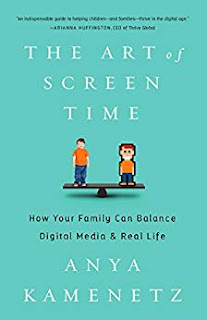As innovative educators know, not all screen time is created equal and one-size-does not fit all when it comes to learning and development. Just like we wouldn't limit a child's book time, writing time, or computing time, we also shouldn't blindly limit the screen time of a young person. It's not the screen that matters. It is what's happening behind the screen that does.
Regardless of what's happening behind the screen though, valuable or not, despite what you may have heard, it is not best for young people to have adults limit their screen time.
Here's why.
Our primary role as parents and educators is to help develop independent learners and thinkers. Asking youth to follow someone else's orders rather than having meaningful conversations about making choices that are best for their personal, emotional, social, and intellectual well-being does them a disservice.
Rather than limiting screen time, talk to young people about choices they are making with their use of time. Also, be ready to discuss your own digital habits and areas that are working well as well as areas that may need to be reconsidered.
In her book, “The Art of Screen Time,” Anya Kamenetz, NPR’s lead digital education reporter, suggests that adults can better support young people if they actually focus on concerns they may have, rather than the screens. Top concerns we have for youth include:
- Healthy habits: Diet, exercise, sleep.
- Learning: Able to pay attention and focus
- Social interactions: Affable, responsible
Young people are already armed with much of this knowledge. For example, they know the power of learning with YouTube and various apps. They may have used technology to assist them in learning or accessing information using tools like voice to text, text to voice, or modifying size and colors of what is on screens. They also may be able to talk about how to limit distractions or what to do when someone acts inappropriately online.
Adults can help young people deepen understanding by moving beyond the headlines and toward taking a look at some of the organizations, publications, and research (i.e. Center for Humane Technology, Common Sense Media, The Art of Screen Time) that address the positive and negative outcomes that result from screen use.
Ultimately, what is best for young people, is not for adults to limit screen time for them. Instead help them develop a deeper understanding that enables them to make informed decisions for themselves.


Hello,
ReplyDeleteI really enjoyed reading your blog. I agree with you that parents should be a tool for their children. As a mother of three young children, (ages 5,6,&8)--I constantly remind them that the internet is just like a kitchen. You can get burned and burn the house down, or you can be careful and enjoy the luxury of cooking. The same goes with the internet: we can get burned with a virus, cyberbullying, or violent games. Or we can use the internet as a luxury and enjoy all of the vast wealth that it offers.
My eight-year old son whose in third grade coordinates playing online games with his friends from class. I showed him the privacy features on the games so when he types can chats with his friend no third party comes interferes with them. Now he learned how to do it and applies the privacy feature all the time. Furthermore, I taught him not to play violent games and taught him the logic behind not playing violent games. He told me: "Okay, Mom." And I was hoping he absorbed most of my logical discussion. One day, I over heard him talking to his friend --while I was in the kitchen and he didn't see me--telling his friend: "No, I don't want to play that game, it's too violent." Then I heard my son argue back with his friend: "I just don't like it. Let's play another game." Then his friend would not budge, and my son replied: "You can play it, but I will not join you--I'll play a different game until you finish." I was smiling--from ear to ear. Trying to resist from running to him and telling him how proud of him I was and how impressed I was with his courage and able to stand up to do the right thing. But, I didn't want to embarrass him and played it cool.
So, I agree with you, that parents should not hover over their children every tiny second of the day. Give the kids some room to breathe and trust that a parents' voice is always inside the mind of the child. The child will appreciate that you trust him/her and will hopefully make the right choices.
I absolutely love this perspective! My child spends a major amount of time on the screen and since I am into health and fitness, it was hard for me to allow it. With that said, we have had conversations that make me feel better, the screen time is shared between, gaming, computer, YouTube and some exercise (yes, and schooling which grades are fantastic). Why this is important, the decision isn't made by me, it is made by my child. It tells me , that my child is using things wisely. And every child is different, just like no one size fits all in a fitness routine.
ReplyDeleteTimes have changed. There will always be an "evil" in the world. First it may have been radio, then television and now smart phones. There will always be something. Kids today will have a device strapped to their hip for the rest of their lives. Teach them how to use it wisely and be an example of how to use it wisely. There is great info and resources out there. Teach your children well. When my children were young and watched tv, we talked about what they were watching and even the commercials sometimes. Trouble with the smartphone is, you can't see what they are looking at.
ReplyDelete